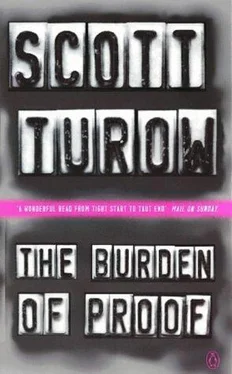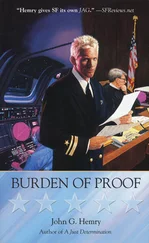Scott Turow - The Burden of Proof
Здесь есть возможность читать онлайн «Scott Turow - The Burden of Proof» весь текст электронной книги совершенно бесплатно (целиком полную версию без сокращений). В некоторых случаях можно слушать аудио, скачать через торрент в формате fb2 и присутствует краткое содержание. Жанр: Детектив, на английском языке. Описание произведения, (предисловие) а так же отзывы посетителей доступны на портале библиотеки ЛибКат.
- Название:The Burden of Proof
- Автор:
- Жанр:
- Год:неизвестен
- ISBN:нет данных
- Рейтинг книги:3 / 5. Голосов: 1
-
Избранное:Добавить в избранное
- Отзывы:
-
Ваша оценка:
- 60
- 1
- 2
- 3
- 4
- 5
The Burden of Proof: краткое содержание, описание и аннотация
Предлагаем к чтению аннотацию, описание, краткое содержание или предисловие (зависит от того, что написал сам автор книги «The Burden of Proof»). Если вы не нашли необходимую информацию о книге — напишите в комментариях, мы постараемся отыскать её.
The Burden of Proof — читать онлайн бесплатно полную книгу (весь текст) целиком
Ниже представлен текст книги, разбитый по страницам. Система сохранения места последней прочитанной страницы, позволяет с удобством читать онлайн бесплатно книгу «The Burden of Proof», без необходимости каждый раз заново искать на чём Вы остановились. Поставьте закладку, и сможете в любой момент перейти на страницу, на которой закончили чтение.
Интервал:
Закладка:
Afterwards, he was unsure how the conversation had ended.
The receiver, with the lighted touch pad on its back, was rectadied and he was looking at his hand on it before he had recovered. He started to redial, but a sage voice urged him to gather himself first. He had learned something in the courtroom. A Yar, called out, lied about that.
Nate would deny misleading him. If confronted, he would tell Stern that, no matter what the form said, it was wrong. He needed to be composed-far more than he was now-to deal with this.
He slowly placed the car in gear and pulled out of the lot.
When he had driven a block or two, under the large stout trees that rose up along the parkways in this part of town, the thought drove through him, sharp and sudden, as if he had been impaled: She had hated him.
Despised him. That, somehow, was what animated all this deceit. He could understand what motivated Nate; that had taken only a few minutes' reflection. He was lying out of cowardice-because he did not want to face Stern with the facts. Not merely Clara's unfaithfulness. That was the symptom, not the cause. But the disease, a kind of brutal and unremitting spousal discontent, was too painful to disclose. And yet it was obvious in every act, in the reeking mess she had left behind for her husband to discover. Never able to speak her mind, she had settled for a graphic demonstration, a life, a home, bespattered and fouled.
And was he to pretend-now that he never knew this? Along River Drive, he was approaching one of many vista points, a space of concrete, with an old Greystone wall bordering the river, and a line of park benches looking out toward the green hills of Moreland and the fashionable suburbs on the western bank.
Abruptly he parked and crossed the street. He leaned over the thick wall, watching the swift waters sluicing by with their hidden, welling currents, twinkling, lambent-La Chandelle-then fell back onto one of the benches.
Only in the years when the children had gone off one by one to college was anything apparent. By the time Kate departed, a brooding desperate quality had come over Clara, a suffering lightlessness that would not yield.
Unfalteringly polite, she was regularly out of sorts, and he was unable to soothe her. In the most indirect of approaches, lie had suggested counSeling, which she instantly rebuffed. Always mute about her discontent, Clara complained now periodically about his unavailability.
The office. His trials. His cigars-it was during this time that he was forbidden to smoke at home. The message in retrospect was clear: He still had his life, in which she had never been included. She had little left. Shocked to be rebuked so directly, Stern had avoided her.
He accepted a series of engagements out of town-a lengthy trial in Kansas City, Seminars and demonstrations of courtroom techniques. He had gone flying across America for months, until he had shrewdly suggested the irresistible, a trip together to the Far East. In Japan, with its monstrous cities and mysterious gardens, they came together again.
But before that, during the Kansas City trial, on one of his rare days at home, he had had what he saw now was the opportunity to look into her heart. The trial, concerning a nasty conspiracy of politicians and union officials, had gone on for fourteen weeks. Stern would fly home on Friday nights, leave again midday Sunday. He was present in body only; he spoke on the phone most of the Weekend or worked at the office downtown preparing for the upcoming government witnesses. On one of those Sundays, Clara had asked him to come with her to a showing of Japanese pots, raiku-ceramics fired directly in the blaze, then rolled in straw for markings. Clara was a passionate admirer of all the Japanese arts. Stern did not have time for this outing, but he agreed, hoping to appease her, knowing she would feel free to buy a substantial piece only if he was along.
She pointed at one pot after another. Did he like it? Once or twice, he made the mistake of allowing his impatience to show. When he saw the effect of this, he began to gesture toward the shelves himself. This one? That? She found his sudden eagerness patronizing and abruptly suggested they leave. 'Certainly there must be one,' he said. She yearned for few physical possessions.
Tersely, Clara shook her head and went ahead of him out the door. A moment, like so many of late, of wholly different aspirations. At the head of the staircase in the dark gallery building, he stumbled and reached back for her hand. The iron newel saved him. When he looked up, Clara had her brow drawn down wearily in irritation, and a rare edge was in her eye. She might as well have proceeded with the pronouncement: He did not please her, in a deep abiding way. The hand he had reached back for, he remembered, had remained at her side.
He had believed that was past. Instead, it seemed now that this was to be Clara's parting look. Guilt had overcome her in the end and she had left behind a message begging forgiveness. But she apologized only for her conduct. The rest could not be changed. Clara's heart, too, had been set to the fire and inkcribed with this hideous grudge. Better she should have torn apart the house, broken all the china, slashed the pictures on the Walls. Instead, full of rage and despair, she had smashed and destroyed herself, and left him to wound himself whenever he stooped for any of the pieces.
He spoke to her of Argentina.
His father had come from Berlin in 1928 to serve as a doctor in the agricultural settlements of Russian Jews who had arrived in the late 1880s and put down near Santa Fe.
There Bruno Stern had met Marta Walinsky. From subsequent comments, Stern took it that his mother believed she had acquired the sum of life's meaningful attainments by marrying a physician. Jacobo came at once, and four years later Alej."andro; Silvia five years after that.
In the same way some actors are always on stage, Papa was always a doctor. He wore a full beard and he was wedded by the heat of fierce anxiety to his professional manner. He walked through the streets of Entre Rios in his white coat and brought it home to Mama to launder. He wore three-piece woolen suits in every season. His fingernails were carefully pared and his hands were whitish and bathed at the start of every day in lavender cologne. He hung his stethoscope about his neck, picked up his medical bag, and walked down two streets to his infirmary each morning. Mama told him that Papa was important. He made people better.
They respected him. Papa loved respect. Something about respect-Stern never knew the precise dimension of his father's failure-brought the family when Stern was almost five to Buenos Aires, with its gracious, cosmopolitan air.
One more unfortunate move. The city folk took them for rubes, and Mama's country relatives treated them at once as disagreeable porterios.
In the United States, word that Stern had grown up as a Jew in Argentina was taken as suggesting dangers only slightly less than if his father had stayed on in Berlin. To be sure, amohg the Argentines there were many anti-Sem-ites.
Mama's cousin Ritella recalled from her rocking chair with emphatic flourishes the Seroaria Trtigica, tragic week, when she was in her teens and roving mobs had entered the Jewish quarter in Buenos Aires with iron bars and barrel staves, beating any Bolshevik they found, which was taken loosely to include virtually any Jew. But for the most part, the years ithe late 1880s and put down near Santa Fe.
There Bruno Stern had met Marta Walinsky. From subsequent comments, Stern took it that his mother believed she had acquired the sum of life's meaningful attainments by marrying a physician. Jacobo came at once, and four years later Alej."andro; Silvia five years after that.
In the same way some actors are always on stage, Papa was always a doctor. He wore a full beard and he was wedded by the heat of fierce anxiety to his professional manner. He walked through the streets of Entre Rios in his white coat and brought it home to Mama to launder. He wore three-piece woolen suits in every season. His fingernails were carefully pared and his hands were whitish and bathed at the start of every day in lavender cologne. He hung his stethoscope about his neck, picked up his medical bag, and walked down two streets to his infirmary each morning. Mama told him that Papa was important. He made people better.
Читать дальшеИнтервал:
Закладка:
Похожие книги на «The Burden of Proof»
Представляем Вашему вниманию похожие книги на «The Burden of Proof» списком для выбора. Мы отобрали схожую по названию и смыслу литературу в надежде предоставить читателям больше вариантов отыскать новые, интересные, ещё непрочитанные произведения.
Обсуждение, отзывы о книге «The Burden of Proof» и просто собственные мнения читателей. Оставьте ваши комментарии, напишите, что Вы думаете о произведении, его смысле или главных героях. Укажите что конкретно понравилось, а что нет, и почему Вы так считаете.












